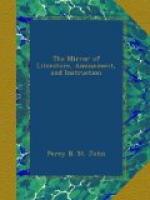Richard de Loveless, who was a courtier, and a very well bred man, being observed to hesitate at the words “after our marriage,” was thereupon desired to explain himself. He replied by talking very largely of his exact complaisance while he was a lover, and alleged that he had not in the least disobliged his wife for a year and a day before marriage, which he hoped was the same thing. (Rejected.)
Joceline Jolly, Esq. making it appear, by unquestionable testimony, that he and his wife had preserved full and entire affection for the space of the first month, commonly called the Honey Moon, he had, in consideration thereof, one rasher bestowed upon him.
After this (says the record) many years passed over before any demandant appeared at Wichenovre Hall,—insomuch, that one would have thought that the whole country had turned Jews, so little was their affection to the flitch of bacon.
The next couple enrolled had like to have carried it, if one of the witnesses had not deposed, that dining on a Sunday with the demandant, whose wife had sat below the squire’s lady at church, she, the said wife, dropped some expressions, as if she thought her husband deserved to be knighted, to which he returned a passionate “pish!” The judges taking the premises into consideration, declared the aforesaid behaviour to imply an unwarrantable ambition in the wife, and anger in the husband.
It is recorded as a sufficient disqualification of a certain wife, that, speaking of her husband, she said, “God forgive him.”
It is likewise remarkable, that a couple were rejected upon the deposition of one of their neighbours, that the lady had once told her husband that it was her duty to obey; to which he replied, “Oh, my dear, you are never in the wrong.”
The violent passion of one lady for her lap-dog, the turning away of her old housemaid by another; a tavern bill torn by the wife, and a tailor’s by the husband; a quarrel about the kissing crust, spoiling of dinners, and coming home late of nights, are so many several articles which occasioned the reprobation of some scores of demandants, whose names are recorded in the aforesaid register.
Without enumerating other particular persons, I shall content myself with observing that the sentence pronounced against one Gervase Poacher is, that he might have had bacon to his eggs, if he had not heretofore scolded his wife when they were over-boiled. And the deposition against Dorothy Doolittle runs in these words—That if she had so far usurped the dominion of the coal fire (the stirring whereof her husband claimed to himself) that by her good will she never would suffer the poker out of her hand.
I find but two couples in the first century that were successful. The first was a sea captain and his wife, who, since the day of their marriage, had not seen one another till the day of the claim; the second was an honest pair in the neighbourhood—the husband was a man of plain good sense and a peaceable temper, and the woman was dumb.




